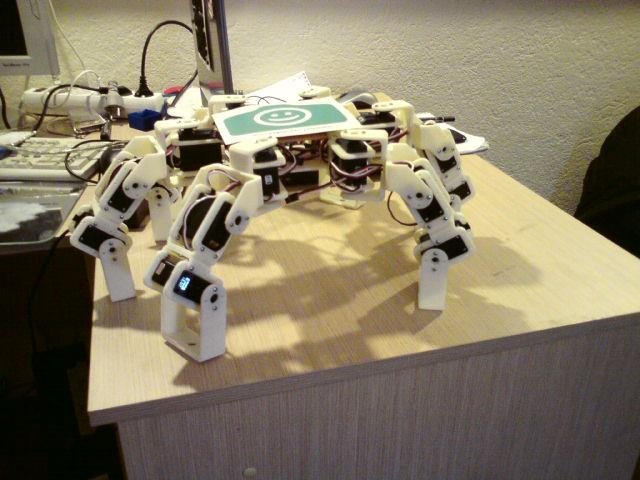
A robot made with a 3D printer at the neuron hackerspace. Republished with permission from neuron's Facebook.
What comes to mind when you hear the phrase “hackerspace”? Before I spoke to Alexander Chemeris, a pioneer of the hackerspace movement in Russia, I imagined hackers as a bunch of nerdy guys in basements trying to control the web by illegally making viruses to break into websites. It turned out that my view of “hacktivism” was very outdated…
What is a “hackerspace”?
Hacking is now associated with education and innovation, a safe space for exploring new ideas in technology, where professionals can share their experiences and where activists can promote open source software and freedom of information.
In his TEDx talk, Mitch Altman from the Noisebridge hackerspace in San Francisco said that hackerspaces merely provide people with tools and spaces to do what they enjoy doing the most. And they are very careful to avoid the computer geek stereotype; Noisebridge technically isn’t even called a hackerspace, it is a non-profit “infrastructure provider for technical-creative projects”. United by common interest, hackerspaces around the world have enabled IT professionals to revolutionize the tech and digital art scenes.
The first hackerspace in Moscow
During the Soviet era, scientific creativity and technological innovation was encouraged among youth as part of the “pioneer movement” with organised clubs in science and engineering. With the political chaos that ensued during the regime change of the 90s, this type of organised group activity vanished.
Chemeris sees hackerspaces as the contemporary version of these technologically oriented youth-led clubs. With its roots in a tradition of collaboration, a hackerspace fills the need for an alternative platform. “There are a lot of good engineers in Russia,” he said, “but they all need to have a space to share their tools and find the right people for their projects.”
After attending Berlin’s 2010 Chaos Communication Congress, the annual meetup organised by Europe’s largest association of hackers, Chemeris had decided to bring the idea home to fill this infrastructure gap.
The first Russian hackerspace project, Neuron, began with a blog post by Chemeris, calling for fellow participants. Together with Alisa Shevchenko, Vladimir Vorontsov, and Dima Oleksyuk, the new group found a space and opened in June 2011.
Moving Forward
Building a community of like-minded people has taken about two years, said Chemeris. The hackerspace initiative has just begun to bloom over the past year. After moving to a new office in a more central location, Neuron Hackerspace attracted a larger group of tech professionals, allowing them to reach a critical mass and to begin spreading.
Today, Moscow hacktivists can attend TEDx lectures in English or various workshops on social media and communication technologies. They can learn to build their own robots at the Neuron Hackerspace, or take advantage of the lastest in the latest 3D printing. The project is expanding, with plans for more courses and a larger space. The model is also spreading further afield; recently, Neuron’s organisers have begun sharing their experiences with activists hoping to organise similar spaces in other cities. The hackerspace culture spread, offering classes on robotics technology in Saint Petersburg, Java script in Kazan, and other events in Yekaterinburg and Kaliningrad.
A public presence?
The relation between projects like this and the local government can be a delicate one. But rather than stay clandestine and appear suspicious, the group has connected with members of government and attended various state conferences, establishing a presence in plain sight. Though they do not work closely, they have a good relationship without confrontation, and have seen some support from the the Department of Science, Industrial Policy and Entrepreneurship in Moscow.
A country with some of the best hackers in the world, could this movement be a way to organise Russia’s tech developers and alternative education practitioners?




4 comments